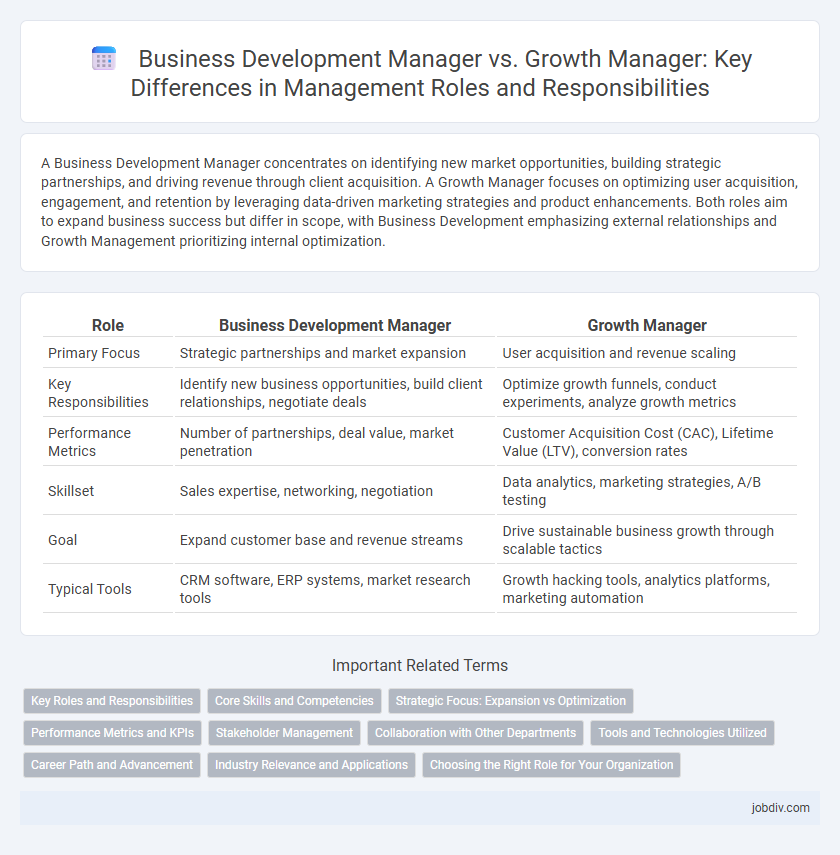A Business Development Manager concentrates on identifying new market opportunities, building strategic partnerships, and driving revenue through client acquisition. A Growth Manager focuses on optimizing user acquisition, engagement, and retention by leveraging data-driven marketing strategies and product enhancements. Both roles aim to expand business success but differ in scope, with Business Development emphasizing external relationships and Growth Management prioritizing internal optimization.
Table of Comparison
| Role | Business Development Manager | Growth Manager |
|---|---|---|
| Primary Focus | Strategic partnerships and market expansion | User acquisition and revenue scaling |
| Key Responsibilities | Identify new business opportunities, build client relationships, negotiate deals | Optimize growth funnels, conduct experiments, analyze growth metrics |
| Performance Metrics | Number of partnerships, deal value, market penetration | Customer Acquisition Cost (CAC), Lifetime Value (LTV), conversion rates |
| Skillset | Sales expertise, networking, negotiation | Data analytics, marketing strategies, A/B testing |
| Goal | Expand customer base and revenue streams | Drive sustainable business growth through scalable tactics |
| Typical Tools | CRM software, ERP systems, market research tools | Growth hacking tools, analytics platforms, marketing automation |
Key Roles and Responsibilities
A Business Development Manager primarily focuses on identifying new market opportunities, building strategic partnerships, and driving sales through relationship management and lead generation. In contrast, a Growth Manager emphasizes optimizing customer acquisition, retention, and product usage through data-driven experiments and cross-functional collaboration. Both roles require strong analytical skills, but the Business Development Manager leans towards external expansion while the Growth Manager concentrates on internal growth metrics and scalable strategies.
Core Skills and Competencies
Business Development Managers excel in strategic partnership building, market research, and client relationship management to drive revenue growth. Growth Managers focus on data analytics, product optimization, and cross-functional collaboration to accelerate user acquisition and retention. Both roles require strong communication, problem-solving skills, and an in-depth understanding of market dynamics, but Business Development prioritizes external opportunities while Growth emphasizes internal scaling.
Strategic Focus: Expansion vs Optimization
A Business Development Manager primarily concentrates on strategic expansion by identifying new market opportunities, forging partnerships, and driving revenue growth through client acquisition. In contrast, a Growth Manager focuses on optimizing existing processes, enhancing customer retention, and leveraging data analytics to improve overall business performance. Both roles are essential but diverge in their approach, with Business Development targeting outward market growth and Growth Management emphasizing internal scalability and efficiency.
Performance Metrics and KPIs
Business Development Managers primarily focus on metrics such as lead generation, client acquisition rates, and revenue growth from new markets, emphasizing relationship-building and sales pipeline expansion. Growth Managers concentrate on performance indicators like customer retention rates, churn reduction, and product engagement metrics, driving sustainable user base expansion through data-driven experimentation. Both roles utilize KPIs tailored to revenue optimization but differ in scope, with Business Development targeting external partnerships and Growth Management focusing on internal scalable growth strategies.
Stakeholder Management
Business Development Managers prioritize building long-term relationships with external stakeholders such as clients, partners, and investors to drive revenue opportunities and market expansion. Growth Managers focus on internal stakeholders, including cross-functional teams, to align strategies that accelerate user acquisition, retention, and product scaling. Effective stakeholder management in both roles requires tailored communication, negotiation skills, and collaboration to achieve organizational growth objectives.
Collaboration with Other Departments
Business Development Managers collaborate closely with sales, marketing, and product teams to identify market opportunities and create strategic partnerships, driving revenue growth. Growth Managers work cross-functionally with analytics, engineering, and customer success departments to optimize user acquisition, retention, and overall product scalability. Both roles rely on seamless interdepartmental collaboration to align business objectives with operational execution and maximize company performance.
Tools and Technologies Utilized
Business Development Managers primarily rely on Customer Relationship Management (CRM) software like Salesforce and HubSpot to identify leads and manage client interactions, while utilizing data analytics tools such as Tableau for market insights. Growth Managers focus heavily on A/B testing platforms like Optimizely, product analytics tools such as Mixpanel or Amplitude, and automation technologies including Zapier to drive user acquisition and retention. Both roles benefit from leveraging AI-powered marketing tools and SaaS platforms to optimize performance and scale business operations efficiently.
Career Path and Advancement
Business Development Managers typically advance by honing expertise in client acquisition and strategic partnerships, progressing toward roles such as Director of Business Development or VP of Sales. Growth Managers focus on data-driven strategies to optimize user acquisition and retention, often advancing to Chief Growth Officer or Head of Product Growth positions. Career paths differ as Business Development emphasizes external relationship building, while Growth Management prioritizes analytics and cross-functional team leadership.
Industry Relevance and Applications
Business Development Managers primarily focus on forging strategic partnerships, expanding market reach, and securing new clients, making them vital in industries like technology, finance, and manufacturing where long-term relationship-building drives revenue. Growth Managers specialize in data-driven strategies, user acquisition, and optimizing customer lifecycle processes, with strong applications in digital sectors such as e-commerce, SaaS, and mobile gaming. Both roles align closely with industry demands; Business Development thrives in environments valuing network expansion, while Growth Management excels in fast-paced, analytics-driven markets aiming for rapid scalability.
Choosing the Right Role for Your Organization
Business Development Managers focus on identifying new market opportunities, establishing strategic partnerships, and driving revenue through client acquisition, making them ideal for organizations prioritizing market expansion. Growth Managers specialize in optimizing product adoption, user engagement, and conversion rates using data-driven strategies, suited for companies aiming to scale existing products efficiently. Selecting the right role depends on whether your organization needs to build external business relationships or accelerate internal growth metrics.
Business Development Manager vs Growth Manager Infographic

 jobdiv.com
jobdiv.com